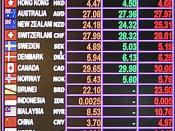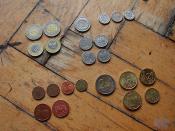The Euro-
The Euro is a currency that will simplify the way Europeans spend money. In 1999 eleven European countries: Germany, France, Italy, Spain, Luxembourg, Belgium, Austria, Portugal, Finland, Ireland, and the Netherlands, replaced their national currencies and introduced a single European currency: the Euro. Britain and Denmark are also hoping to soon join this great coalition (Knot 1). The Euro is the official currency in the twelve participating countries. Bills and coins of the national currencies will remain in circulation or may eventually die out. This event is one of astronomical historical importance as it unifies Europe into one massive economic force. The transition of the Euro into the world market as paper money will start in 2002. It has many people wondering how the Euro will affect Europe and the world. The future looks optimistic as this is a major step in the unification of an otherwise separated area.
The introduction of the Euro will be beneficial to Europe and the world as a whole through improving travel and trade inside of Europe, stabilizing the economies of other currencies and bringing all of Europe one step closer to the ideal of unification.
The introduction of the Euro will facilitate travel in Europe by reducing hassle and expense. Imagine going to Europe and traveling through the many small countries. Don't forget to convert your Deutsch Marks, Franks, Guilder, Drachma, Kroner, Florints, Lira, and Schillings. Looking for the best deal and finding places to change your money can turn into a huge headache. When using the Euro one does not lose time and money by paying for new currencies between every small country. In Europe many of the countries are small and close together. Living in a large state like Texas it is hard to visualize how a person...



Best essay ever!!
great job petra
4 out of 4 people found this comment useful.